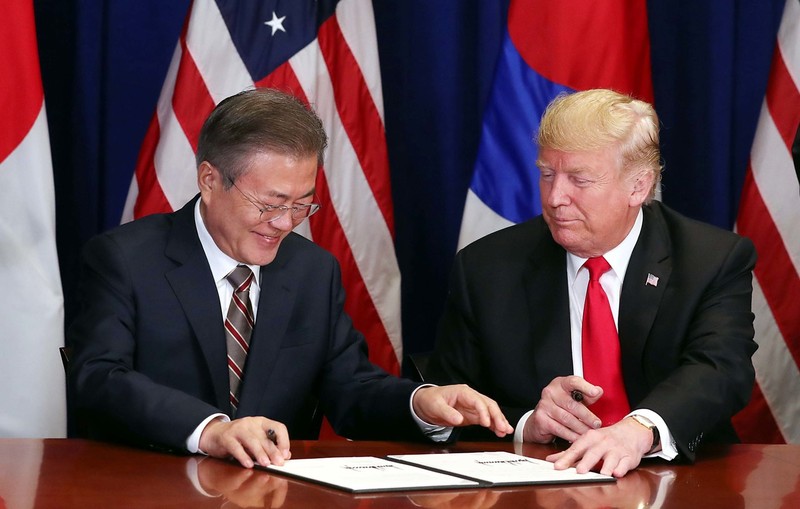 |
|
South Korean President Moon Jae-in and US President Donald Trump at the signing of the amended South Korea-US Free Trade Agreement in New York on Sept. 24. (Blue House photo pool)
|
Trump indicates he’ll review Moon’s request
At a bilateral meeting between South Korea and the US on Sept. 24 in New York, South Korean President Moon Jae-in asked for an exemption for South Korean automobiles from Section 232 of the US Trade Expansion Act. In response, US President Donald Trump instructed an attendant at the summit to review Moon’s request. Moon made the above request at the signing of the recently amended US-Korea Free Trade Agreement (KORUS FTA) between the trade ministers of both countries, also directly addressing Trump and expressing his opinion that additional import tariffs would be unreasonable. The South Korean automobile and automobile parts industries are watching keenly for the possibility that the US government might acquiesce to this request. Under Trump’s orders, since May of this year, the US Department of Commerce has been investigating whether the import of foreign-made automobiles and automobile parts poses a security threat to the US. If it is concluded that the investigation is harmful to US security, then the US will impose various trade restrictions, such as high tariffs, targeting foreign automobiles and parts. At the bilateral meeting with the US, Moon pointed out that the trade surpluses of other US trade partners including China, Japan Germany and Mexico increased dramatically, but that the trade surplus of South Korea decreased dramatically, as he requested exemption for South Korea from Section 232 of the US Trade Expansion Act. The fact that President Moon made this request officially on the day of the signing of the amended KORUS FTA is also worthy of note. Through the amendment of the trade agreement, the tariff on pickup trucks exported by South Korean companies, due to end on Jan. 1, 2021, will last for another 20 years, and entering the South Korean market has become easier for US automakers. In other words, it seems that the demands of the US were successfully reflected in the revised agreement. Domestic civil and social groups and those in relevant industries have pointed out that South Korea should have obtained immunity from Section 232 in exchange for acquiescing to the automobile industry-related demands of the US Previously, on Aug. 8, the Wall Street Journal (WSJ) reported that Democratic Party floor leader Hong Young-pyo, in a meeting with Secretary of Commerce Wilbur Ross, said, “In case the US invokes Section 232 to impose additional tariffs on South Korean cars, the National Assembly cannot ratify the revised trade deal,” during a trip to the US with a delegation of ruling and opposition party legislators. The WSJ also noted that the trade deal was “in jeopardy because Mr. Trump subsequently threatened to impose tariffs of up to 25 percent on auto and auto-parts imports on national-security grounds under Section 232 of a 1962 trade law.” Affected industries in South Korea have shown a variety of reactions, ranging from, “It’s worth hoping, since President Trump did instructed a review of the request,” to “It’s too early to be optimistic.” Previously, Mexico succeeded in avoiding high tariffs from Section 232 through a NAFTA renegotiation. Instead, the US imposed an import quota at 240,000 products. Any Mexican-made automobiles that surpass this number will be heavily taxed. By some analyses, the US midterm elections, which will be on Nov. 6, will play a deciding role in whether Section 232 will be invoked or not. At a news briefing in New York, Trade Minister Kim Hyun-chong of the Ministry of Trade, Industry and Energy announced that the greatest efforts would be made to secure exemption from Section 232 for South Korea. By Choi Ha-yan, staff reporter Please direct comments or questions to [english@hani.co.kr]






